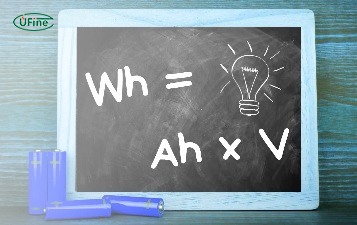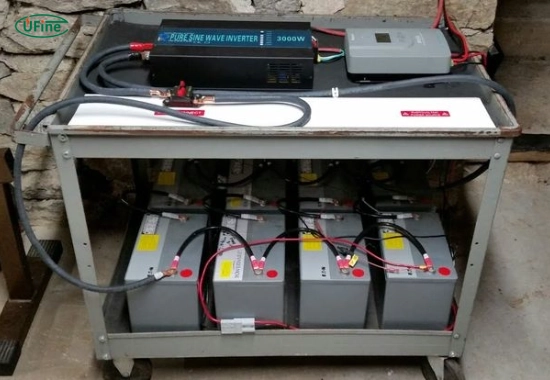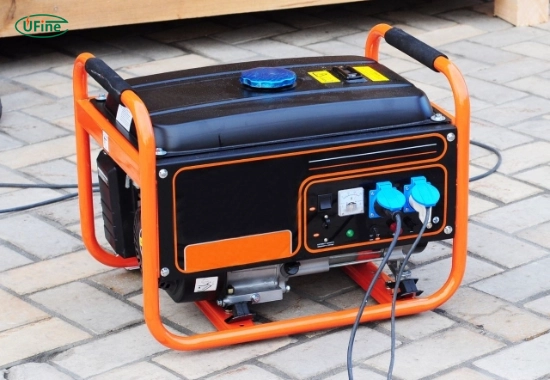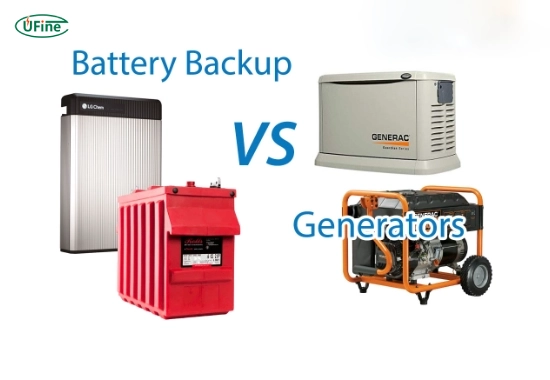
- Part 1. What is a house battery backup, and how does it work?
- Part 2. How does a generator compare to a house battery backup?
- Part 3. House battery backup vs. generator: Which offers more power?
- Part 4. Environmental impact of house battery backup systems vs. generators
- Part 5. Noise levels: house battery backup vs. generator
- Part 6. Maintenance requirements for house battery backup systems and generators
- Part 7. Cost comparison between house battery backup systems and generators
- Part 8. Energy independence with a house battery backup
- Part 9. Safety considerations between house battery backups and generators
- Part 10. Can you combine a house battery backup system with a generator?
- Part 11. FAQs about house battery backup and generators
What is better for home power outages: a house battery backup or a generator?
The simple answer is this: a house battery backup is cleaner, quieter, and more sustainable, while a generator offers robust power for extended outages and larger energy needs. Choosing the right option depends on your home’s energy usage, budget, and goals for energy independence.
We’ll dig deep into how each system works, its pros and cons, costs, maintenance requirements, environmental impact, and much more. Whether you’re preparing for natural disasters, looking for energy independence, or want peace of mind during outages, this article will help you decide which backup power solution is best for your home.
Part 1. What is a house battery backup, and how does it work?
A house battery backup system stores electricity for future use. It operates like a large rechargeable battery that powers your home when the primary electrical grid goes down. Most systems are installed in conjunction with solar panels, but they can also be charged from the grid during off-peak hours.
When the power goes out, the battery backup system automatically detects the outage and begins supplying electricity to your home. It can power essential devices such as refrigerators, lights, routers, and medical equipment, depending on its capacity.
Some of the most popular house battery backup systems include the Tesla Powerwall, LG Energy Solution RESU, Enphase IQ Battery, and Generac PWRcell. These systems are modular, meaning you can add more units to increase storage capacity and extend the duration of your backup power.
Part 2. How does a generator compare to a house battery backup?
A generator is a machine that converts mechanical energy into electricity using fuel such as gasoline, diesel, propane, or natural gas. Unlike a house battery backup, which stores energy, a generator actively produces electricity while it is running.
There are two main types of generators used in residential settings:
- Portable generators that must be manually operated and are moved into place when needed.
- Standby generators that are permanently installed and automatically start when a power outage is detected.
Generators are known for their ability to provide continuous power for long periods, which is particularly useful for extended blackouts or homes with high energy demands.
Part 3. House battery backup vs. generator: Which offers more power?
Generators usually produce more electricity over longer periods in terms of raw power output. A standby generator can run indefinitely, assuming it has a continuous fuel supply. This makes it the ideal choice for households that need to keep large appliances running for several days or more during prolonged outages.
On the other hand, a typical house battery backup system can provide power for several hours to a day, depending on the size of the system and your home’s energy consumption. Although you can install multiple batteries to increase capacity, this significantly raises the cost.
Suppose you need to run high-power devices such as air conditioning units, water heaters, or electric ovens. In that case, a generator may be a more practical solution. However, if your primary concern is keeping lights, internet, and refrigeration running during short outages, a house battery backup could be all you need.
Part 4. Environmental impact of house battery backup systems vs. generators
House battery backup systems are far more environmentally friendly than generators. Batteries produce zero emissions during operation and are often paired with solar panels, which generate clean energy from the sun. This means your backup power is not only quiet but also sustainable.
Generators, by contrast, rely on the combustion of fossil fuels. This process releases carbon dioxide, nitrogen oxides, and other pollutants into the air. Even the cleanest natural gas generators contribute to greenhouse gas emissions.
Suppose your goal is to reduce your carbon footprint and support clean energy initiatives. In that case, a house battery backup system is the clear winner in terms of environmental responsibility.
Part 5. Noise levels: house battery backup vs. generator
When it comes to noise, house battery backup systems are silent. They operate without any moving parts or combustion engines, which means they make no noise at all during use. This makes them ideal for residential areas, especially in neighborhoods with noise restrictions.
Generators, however, can be pretty noisy. Portable models are especially loud, often sounding like a lawnmower when in use. Even standby generators, which are designed to be quieter, still produce a noticeable hum. If peace is essential to you or your neighbors, a battery backup system is the better choice.
Part 6. Maintenance requirements for house battery backup systems and generators
One of the most significant advantages of a house battery backup system is that it requires minimal maintenance. These systems are designed to last for 10 to 15 years with little intervention. Most come with monitoring apps that allow you to check battery levels and system performance in real time.
Generators require more ongoing attention. Maintenance tasks include:
- Regular oil changes
- Fuel refills or fuel line checks
- Replacing filters
- Periodic testing
Without proper maintenance, generators may fail when you need them most. If you prefer a low-maintenance solution, house battery backups are the superior option.
Part 7. Cost comparison between house battery backup systems and generators
The cost of backup power systems can vary widely depending on the size of your home, the amount of power you need, and whether you include solar panels.
Here’s a general cost breakdown:
| System Type | Initial Cost | Installation | Maintenance (Annual) | Fuel Cost | Total Lifetime Cost (10–15 years) |
|---|---|---|---|---|---|
| House Battery Backup | $12,000–$18,000 | $2,000–$4,000 | $100–$200 | None (solar), or low grid | $16,000–$25,000 |
| Generator (Portable) | $600–$1,500 | $100–$300 (DIY or basic) | $100–$150 | $500–$1,000/year (gasoline) | $7,000–$12,000 |
| Generator (Standby) | $4,000–$8,000 (unit only) | $3,000–$5,000 (pro install) | $200–$500 | $300–$800/year (natural gas/propane) | $15,000–$25,000 |
While house battery backup systems cost more upfront, they save money in the long run by avoiding fuel costs and requiring little maintenance. Additionally, many regions offer tax incentives and rebates for installing solar-plus-battery systems, which can reduce your total investment.
Part 8. Energy independence with a house battery backup
One of the most significant benefits of a house battery backup system is the potential for energy independence. When paired with solar panels, a battery system can allow your home to function off-grid, meaning you are less reliant on utility companies.
This can be particularly valuable in areas with high electricity rates, frequent blackouts, or unreliable infrastructure. Solar energy stored in your battery can keep your home powered day and night, providing greater control over your energy use and costs.
Generators do not offer the same level of independence. They rely on external fuel sources and do not seamlessly integrate with renewable energy systems, as house battery backups do.
Part 9. Safety considerations between house battery backups and generators
Safety is a significant consideration when choosing a backup power system. House battery backup systems are inherently safer because they do not produce emissions, have no moving parts, and do not involve combustible fuels. They can be installed indoors or in garages without special ventilation because they do not emit dangerous gases.
Generators, on the other hand, must be used with care. Gasoline and propane are flammable, and improper use of a generator can lead to carbon monoxide poisoning. Generators must be installed outdoors and away from windows to avoid hazardous fumes entering the home.
If safety is your top concern, a house battery backup system is the safer and more convenient option.
Part 10. Can you combine a house battery backup system with a generator?
Yes, and this is becoming a popular solution. Some homeowners choose to combine both systems to get the benefits of each.
In this setup:
- The house battery backup handles short outages and provides silent, eco-friendly power.
- The generator serves as a secondary backup for more extended outages when the battery is depleted.
This hybrid approach ensures that your home stays powered under all conditions while minimizing generator run time, noise, and fuel consumption.
Part 11. FAQs about house battery backup and generators
How long can a house battery backup power a home?
A typical house battery backup can power essential devices for 8 to 24 hours, depending on usage and the number of batteries installed. With solar panels, the battery can recharge during the day and extend runtime indefinitely.
Is a house battery backup better than a generator for short outages?
Yes. For short outages, a house battery backup is more convenient, silent, and automatic. It requires no fuel, no setup, and no noise.
Can I install a house battery backup without solar panels?
Yes. You can charge the battery from the electrical grid. However, pairing it with solar panels improves efficiency and reduces your electricity bills.
Are there government incentives for installing a house battery backup?
In many countries and states, there are tax credits, rebates, and incentives for installing battery backup systems, especially when combined with solar. These can lower the total cost significantly.
Which is more reliable during severe weather events?
If solar charging is limited, a generator may provide more continuous power during multi-day storms. However, a house battery backup is more reliable in terms of low maintenance and instant response.
Related Tags:
More Articles

What are Watts and Watt Hours in Battery?
Understand watt vs watt-hour in batteries, how to calculate battery watt hours, and what Wh means for car batteries, devices, and energy storage.
A Complete Guide to the Best Batteries for Flashlights
Compare the best batteries for flashlights, including AA, AAA, 18650, 21700, CR123A. See which battery offers the best brightness, runtime, and reliability.
How Long Do Rechargeable AA Batteries Last?
How long do rechargeable AA batteries last? Compare NiMH and lithium AA lifespan, recharge cycles, key factors, and performance vs alkaline batteries.
How Much Current Can a 9V Battery Really Supply?
Discover how many amps a 9V battery can supply, its actual current output, discharge rate, and capacity for alkaline, lithium, and rechargeable 9V batteries.
12V STD vs 12V AGM: Meaning, Differences, and Which Is Better
Understand what STD and AGM batteries mean, their key differences, and which 12V battery fits your needs best in 2026.





